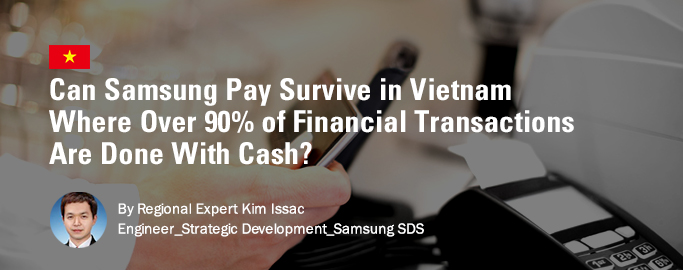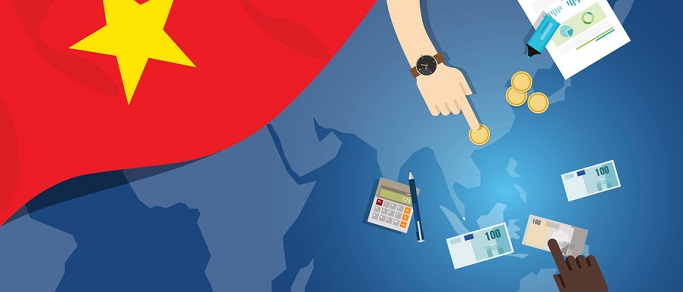
The mobile payment service allows the user to save their credit/debit card’s information onto their smart phones and use their phone to do transactions by placing their phone gently onto the payment devices.
Since mobile payment service is compatible with the existing conventional card payment terminals, more than 90% of all the stores in Korea as well as the United States are using it.
Samsung Pay, one of mobile payment service, is equipped with Nexsign, a biometric authentication solution made by Samsung SDS. Customers can receive enhanced security for their mobile payment services with their fingerprint/iris verifications.
For this article, we will take a look at how the Samsung Pay mobile payment service is being used in Vietnam and the issues that comes along with the usage. It will be analyzed by engineer Kim Isaac, a regional expert of Vietnam.
If you go on a trip just by relying on ‘Samsung Pay’ and bring no cash…..
On Vietnamese IT news website Genk.vn, some Vietnamese have held a strange themed trip using Samsung Pay. The plan was to go on a trip around Vietnam, except during the trip every payment had to be paid using Samsung Pay service. The idea was fun and brilliant but the reality was different. Despite their expectation that this trip will be fun which caused them to flutter, it was clear that traveling with Samsung Pay as the only method of payment had its downsides. Whenever they tried to pay with Samsung Pay, the shop owners who were not accustomed to mobile payment services stared at travelers with their baffled expressions. A strange situation where the customer had to explain their payment method occurred.
What is the real reason behind why the simple and convenient ‘Samsung Pay’ couldn’t settle?
I was curious why Samsung Pay service which was largely successful in South Korea did not earn much attention in Vietnam. At the end of the second half of 2017, Samsung Pay initiated its first service in Vietnam, and during the first 3 months, Samsung Pay users increased to 209,000. Also, it received an award at the ‘Tech Awards 2017’ for being the definitive mobile payment solution in Vietnam.
Samsung Pay also used aggressive marketing and PR strategies to make itself known to the people of Vietnam. Due to its effort, when people in Vietnam are asked if they know Samsung Pay, about 7 out of 10 people answered yes. However, when asked if they want to use Samsung Pay, they answered that they don’t really have the reason to use it, showing a reluctant reaction towards the service.

I assume it is due to these three reasons.
First, there are geographical limits. Only large cities like Hanoi and Ho Chi Minh City can use card as their payment services, therefore for the people living in other smaller areas do not find services like Samsung Pay to be much useful.
Second, there are many smartphone that is not compatible with Samsung Pay. Most people in Vietnam use different or cheaper brand for their smart phones.
Third, people of Vietnam prefer cash transactions rather than card settlements. 90% of their transactions are done through cash, and only 30% of the citizens have bank accounts (“Vietnam’s Payment Preferences: Four Trends to Watch”, Vietnam Briefing July 12, 2017.)
I deduce that, due to their low confidence towards banks and their low income, they do not have any reason to use bank services. Samsung Pay requires you to have credit cards or debit cards in order to use services, therefore cannot be used by most of the people in Vietnam. However, Vietnam still does have mobile payment services like Samsung Pay.
According to the article ‘Mobile Payments Vietnam’, since December 2014, State Bank of Vietnam (SBV) authorized the Vietnamese bank and non-banking institutions to provide payment services in Vietnam, and currently 27 non-banking institutions have received their licenses (Fintechnews.sg, April 4, 2018). However, these payment services, unlike Samsung Pay, allow the users to use the ATMs to charge their account and use it directly without any banking card services. This allows them to have access to mobile payments services without the help of banks. However there is still the problem that with the exception of large cities, most areas of Vietnam do not have ATMs.
Lastly, most of the shops in Vietnam do not have the devices ready for card transactions, or does not allow payment through cards if it is below a certain amount.
Can a 90% cashless society be possible by the 2020?
Vietnam aims to change their economy so that 90% of their transactions are done cash free by decreasing cash transactions and increasing electronic payments (“Vietnam’s Payment Preferences: Four Trends to Watch”, Vietnam Briefing, July 12, 2017). Not only that, the National Payment Corporation of Vietnam (NAPAS) is seeking to expand its mobile payment service in parallel with plastic card issuance.
As such, the Vietnamese government and their Federation of Banks are working hard to increase their credit card payment ratio. If their regulatory change, implementation of new technologies, proliferation of online banking, introduction of Fintech into enterprises, and increased usage of internet all leads to their success in establishing their ‘90% of transaction done with no cash society by 2020’, the success rate of Samsung Pay in Vietnam will also increase. However, at the moment it seems like it will require more time.
*NAPAS: a provider of financial switching services and electronic clearing services in Vietnam
By Regional Expert Kim Issac
Engineer_Strategic Development_Samsung SDS

